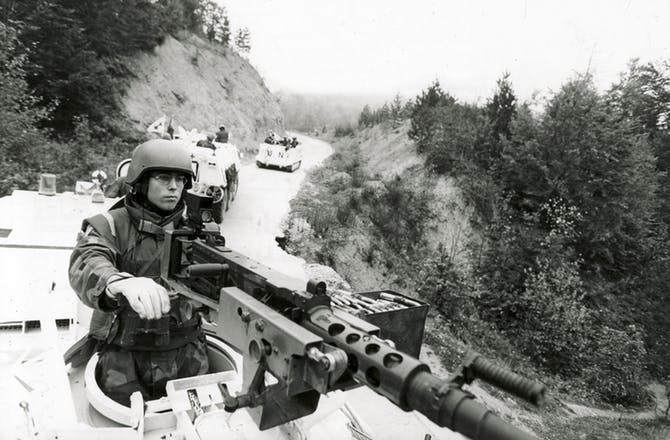Submission Statement
From the Wikipedia article on mission command: Mission command, also referred to as mission-type tactics, is a style of military command, which is derived from the Prussian-pioneered mission-type tactics doctrine, combines centralized intent with decentralized execution subsidiarity, and promotes freedom and speed of action, and initiative within defined constraints. Subordinates, understanding the commander’s intentions, their own missions, and the context of those missions, are told what effect they are to achieve and the reason that it needs to be achieved.
While in theory this form of command is widely adopted by Western militaries in practice political objectives and commanding officers’ own tendency to micromanage often end up constraining subordinates to narrow courses of action. This article details a particularly salient case where the opposite occurred. NORDBAT2 was able to flaunt political constraints to carry out what it saw as the overarching mandate, contrasting with other UN forces at the time. This is an entertaining read that encapsulates the promise(and perils) of mission command.
Tony Ingesson is currently an Assistant Professor of Political Science at Lund University. His research is primarily focused on the political impact of tactical-decision-making and organizational cultures. He has previously served in the Swedish Army, Air Force and Navy.
In late 1993, a reinforced Swedish-Danish-Norwegian mechanized battalion (Nordbat 2) deployed to Bosnia as part of an ongoing UN peacekeeping mission, known as UNPROFOR (United Nations Protection Force).[1] The battalion was under Swedish command, and with the exception of a Danish tank company and a Norwegian helicopter detachment, was comprised of Swedish former conscripts, led by active-duty officers. The former conscripts had volunteered to return from civilian life to serve in a professional capacity. These Swedish troops, coming from a nation that had not experienced war for almost 200 years, faced a rigid UN bureaucracy, an unclear mandate, and the UN-imposed rules of engagement bordered on the absurd.[2] However, the Swedes had one thing the others didn’t: a culture of mission command that had grown and developed for decades.
To the surprise of many, even in Sweden, Nordbat 2 quickly established a reputation as one of the most trigger-happy UN units in Bosnia. The troops and officers from some of the least belligerent nations in the world turned out to be quite adept at both using force and playing the odds in a high-stakes political game. This article outlines how a well-entrenched culture of mission command enabled Nordbat 2 to take on completely new and unexpected situations with remarkable results. While this culture of mission command turned out to be a potent force multiplier and an exceptionally effective strategic asset, it also had another side: Nordbat 2 on multiple occasions utterly disregarded orders from its highest political authorities, to the frustration of the Swedish government.
In “The Language of Mission Command and the Necessity of an Historical Approach,” Jörg Muth argues that the U.S. Army needs to understand the culture of mission command in order to implement it.[3] This article provides a brief case study of the tactical and strategic impact of one such culture. While the events described here occurred over twenty years ago, they are as relevant as ever to further our understanding of the strategic role of leadership culture in mission command.
The most essential component of mission command is trust. As long as political leaders can trust the local commander to make the right choices, mission command can be an incredibly powerful force multiplier. Even though Nordbat 2’s first battalion commanders were very unpopular with the Swedish government for their refusal to take orders from home, they were nevertheless greeted as heroes upon their return and remain viewed so to this day. This meant the Swedish government did not have to deal with the political fallout of the otherwise failed UN mission. The Dutch government, for example, was hard-pressed by public opinion after the massacre at Srebrenica in the summer of 1995. In 2002, the entire Dutch government was forced to resign over Srebrenica, after a detailed report blaming the government for the failure was released to the public.
While unrestrained mission command can be an effective tool, it also requires that political leadership relinquishes a significant degree of control. Thus, to be effectively harnessed in complex operational environments, the culture of mission command is one that has to be understood and to some extent shared by the civilian leadership as well as the military. This approach is clearly not without risk, but in a life-and-death scenario the basic rule of mission command remains relevant: it is better to make a mistake than to do nothing at all.

